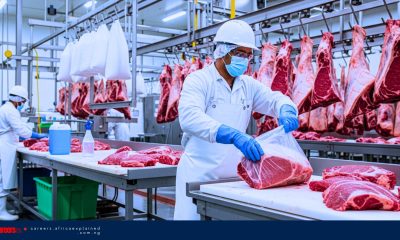Canada Sponsorship
Jobs Openings At The Smithers Sausage Factory Ltd. – Smithers, BC

Job Title: Meat Packager
Location: Smithers, BC
Shift: Morning, Night, Overnight
Wage: $20.00 per hour
- Education: No degree, certificate or diploma
- Experience: Experience an asset
Work setting
- Meat processing and/or packing plant/establishment
Tasks
- Food safety/handling skills
- Manually pack goods into bags and boxes or other containers
- Feed and unload processing machines
- Check products and packaging for basic quality defects
- Assist process control and machine operators in performing their duties
- Clean machines and immediate work areas
Work conditions and physical capabilities
- Standing for extended periods
- Fast-paced environment
Personal suitability
- Flexibility
- Reliability
- Team player
Support for persons with disabilities
- Provides awareness training to employees to create a welcoming work environment for persons with disabilities
Support for Indigenous people
- Provides cultural competency training and/or awareness training to all employees to create a welcoming work environment for Indigenous workers
- Work Term: Permanent
- Work Language: English
- Hours: 40 hours per week
What does the job involve meat packager Job?
A meat packager is responsible for preparing and packaging meat products for distribution and sale. The job involves several tasks, including:
- Inspecting and Sorting: Meat packagers inspect incoming meat products to ensure they meet quality and safety standards. This may involve checking for freshness, proper labeling, and any signs of damage or contamination. They also sort meats based on type, cut, and packaging requirements.
- Cutting and Trimming: Depending on the specific requirements of the job, meat packagers may need to trim excess fat, remove bones, or cut meat into smaller portions. This requires attention to detail and the ability to follow specific instructions to ensure consistency and uniformity in the final product.
- Packaging: Meat packagers package meat products according to predetermined specifications. This may involve wrapping individual cuts of meat in plastic or butcher paper, vacuum sealing packages, or placing meat in containers for storage or display. They also label packages with relevant information such as product name, weight, expiration date, and handling instructions.
- Weighing and Pricing: Meat packagers often weigh packaged meat products to ensure they meet weight requirements and are priced accurately. They may use scales or other weighing equipment to measure the weight of individual packages or batches of meat.
- Sanitation and Hygiene: Maintaining cleanliness and hygiene in the work area is crucial in meat packaging to prevent contamination and ensure food safety. Meat packagers are responsible for following sanitation protocols, including cleaning equipment, surfaces, and utensils regularly, as well as wearing appropriate protective gear such as gloves and hairnets.
- Quality Control: Meat packagers may be involved in quality control procedures to ensure that all products meet company standards and regulatory requirements. This may include conducting visual inspections, performing sensory evaluations, and monitoring temperature and storage conditions to prevent spoilage.
- Inventory Management: Some meat packagers are also responsible for managing inventory levels and replenishing stock as needed. This may involve keeping track of product quantities, rotating stock to maintain freshness, and coordinating with suppliers or purchasing departments to reorder supplies as necessary.
Overall, the job of a meat packager requires attention to detail, adherence to safety and hygiene standards, and the ability to work efficiently in a fast-paced environment to meet production goals and customer demands.
What are the main requirements for the job meat packager?
The requirements for a meat packager position can vary depending on the employer and specific job responsibilities, but some common requirements may include:
🔥Latest Job Vacancies in Canada (Updated Daily)
🇨🇦 Sponsorship Jobs in Canada: Personal Support Worker – Toronto, ON
Apply Now🇨🇦 Family Child Care Provider Job with Sponsorship – Ontario
Apply Now🇨🇦 Visa Sponsorship Jobs in Canada – Dump Truck Driver | Saskatoon, SK – APPLY NOW
Apply Now- Physical Stamina: Meat packaging often involves standing for long periods, lifting heavy objects, and performing repetitive tasks. Candidates should be physically fit and able to handle the demands of the job.
- Attention to Detail: Meat packagers need to pay close attention to detail to ensure that products are properly sorted, packaged, and labeled according to specifications. This helps maintain quality and consistency in the final products.
- Basic Math Skills: Meat packagers may need to weigh and measure products, calculate quantities, and price items accordingly. Basic math skills are essential for performing these tasks accurately.
- Food Safety Knowledge: Candidates should have a basic understanding of food safety principles and practices to prevent contamination and ensure product quality. This may include knowledge of proper sanitation procedures, temperature control, and hygiene practices.
- Manual Dexterity: Meat packagers often use knives, packaging equipment, and other tools to perform their duties. Good hand-eye coordination and manual dexterity are important for handling these tools safely and effectively.
- Teamwork Skills: Meat packagers typically work as part of a team in a fast-paced production environment. The ability to communicate effectively, collaborate with coworkers, and contribute to a positive work environment is essential.
- Adherence to Regulations: Depending on the location and type of facility, meat packagers may need to comply with various regulations and standards set by government agencies such as the USDA (United States Department of Agriculture) or FDA (Food and Drug Administration). Familiarity with relevant regulations and the ability to follow procedures to ensure compliance is important.
- Reliability and Punctuality: Employers rely on meat packagers to complete tasks efficiently and meet production deadlines. Candidates should be reliable, punctual, and able to work scheduled shifts as required.
- High School Diploma or Equivalent: While not always required, many employers prefer candidates who have a high school diploma or GED equivalent. Some positions may also require additional training or certification in food safety or handling.
These are general requirements, and specific qualifications may vary depending on the employer and the nature of the job.











